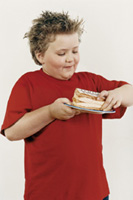More U.S. children and men getting fat
More American children are getting fat, with more than one-third now overweight. More of their dads are getting heavy, too.

But the percentage of women who are overweight seems to have peaked, leading some experts to wonder if the U.S. obesity epidemic may soon be leveling off.
Overall, larger proportions of the U.S. public are overweight than ever before, according to the government's most accurate recent check of the nation's girth. But women, who as a group are more obese, seem to be holding steady.
The study didn't examine why more men and children are getting fatter and women aren't. But some experts think the leveling off in women could signal a turning point in the nation's obesity epidemic.
"Women have always been more responsible about health than the general population," said Dr. William Dietz, of the U.S. Centers for Disease Control and Prevention, which reported the new data.
"I'd like to think this shows women are leading the way in recognizing obesity as a health threat," said Dietz, director of the CDC's Division of Nutrition and Physical Activity.
Another piece of research also suggests a turn. The NPD Group, a New York-based market research firm, found the percentage of overweight adults has held steady from 2002 to 2005.
"I would say it has leveled off. The bad news is we haven't found a way to lose weight," said Harry Balzer, vice president of NPD, which each year tracks what thousands of people eat and their self-reported height and weight.
The CDC report is being published in this week's Journal of the American Medical Association.
The findings come from the CDC's National Health and Nutrition Examination Survey, which collects data on a sample of about 5,000 people each year. The researchers clustered years together, presenting calculations for 1999-2000, 2001-2002 and 2003-2004.
The survey is considered the gold standard for obesity data, it's done through in-person examinations that include actual height and weight measurements.
That beats telephone surveys, in which men tend to overstate their height and heavy people underestimate weight, throwing off obesity calculations, said Cynthia Ogden, the study's lead author.
The study found the percentage of men who are overweight rose to 71 percent in 2003-2004, from 67 percent in 1999-2000. The obese percentage rose to 31 percent, from 27.5 percent.
For women, both the overweight and obese percentages held steady, at about 62 percent and 33 percent, respectively.
Why women held steady is not clear, but Balzer said it may have to do with a leveling of employment rates for women since the late 1990s. He also noted a leveling of the percentage of Americans who eat meals at home - home portions are considered healthier than what is eaten in restaurants.
For children, the percentage of boys, ages 2 to 19, who were seriously overweight, or obese, rose to more than 18 percent in 2003-2004, from 14 percent four years earlier. For girls, the percentage rose to 16 percent, from about 14 percent.
The CDC study also offered data on the percentage of kids who were heavier than 85 percent of children the same age and sex, as recorded in an earlier growth chart benchmark. Those children are customarily referred to as overweight, though the CDC does not use that term.
The percentage of kids in that category shot up to almost 34 percent in 2003-2004, compared to 28 percent in 1999-2000.
"I think the bad news about children far outweighs the good news about women," said Kelly Brownell, director of Yale University's Center for Eating and Weight Disorders.
A leveling off of obesity in women isn't such great news, either, if 1 out of 3 women still are obese, he added.
"I would hate for people to feel complacent like we're somehow winning this battle because you have a problem leveling off at a terrible point," Brownell said, reports AP.
O.Ch.
Subscribe to Pravda.Ru Telegram channel, Facebook, RSS!




